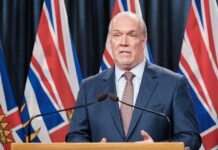
Photo: Vinnie Combow
THE Government of British Columbia announced on Tuesday that it is moving forward with its plan to eliminate Medical Service Plan (MSP) premiums and introduce the employer health tax (EHT).
Together, these measures will reduce taxes on people and businesses by approximately $800 million each year.
“The last government chose to double MSP fees, costing families hundreds of dollars a year. People deserve a break, which is why we’re eliminating regressive MSP premiums,” said Finance Minister Carole James. “The EHT is a fairer approach, similar to other provinces, and that means lower taxes for British Columbians.”
The government tabled the Employer Health Tax Act in the legislature on October 16. Less than 5% of B.C. businesses will pay the full EHT rate of 1.95%, and the majority of small businesses are protected with a $500,000 exemption amount that phases out gradually. The legislation also establishes a $1.5-million exemption amount for charities and non-profits, and is similarly phased out.
The B.C. government will eliminate MSP premiums by January 1, 2020, saving individuals up to $900 each year, and families as much as $1,800. As a result, millions of people will have more money in their pockets and more to invest in B.C. businesses. In addition, the administration of MSP premiums is costly and inefficient. Transitioning to the EHT will save more than $50-million annually, according to the government.
B.C.’s EHT rate is tied with Ontario for the lowest payroll tax rate in the country. B.C. will continue to have one of the most competitive tax systems in the country with this $800-million annual reduction in taxes.











